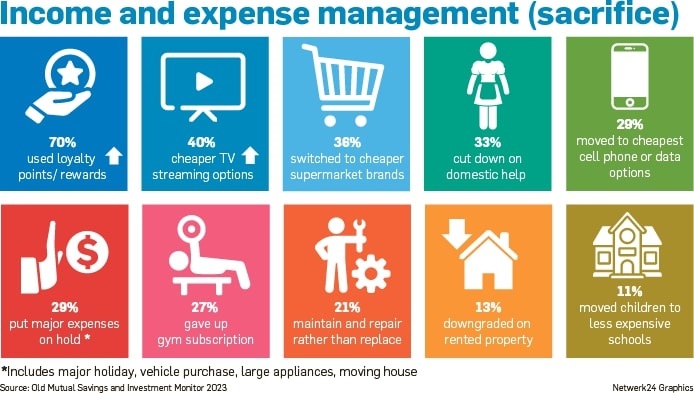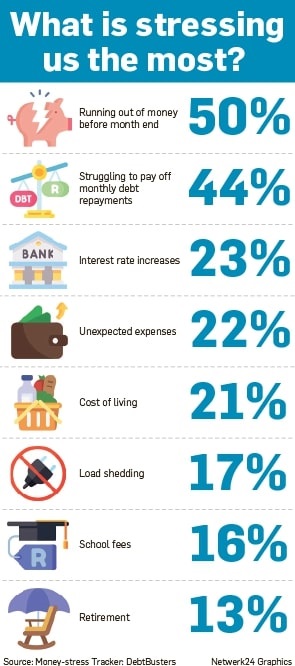
Financially stressed, drowning in debt and struggling to buy basics were the overwhelming results of two separate financial consumer surveys released this week.
DebtBusters’ second annual Money-Stress Tracker, which surveyed 35 000 individuals who were not undergoing debt counselling, found that 78% of respondents were experiencing financial stress. This was impacting their home life, work life and even their health. The survey found that women, in particular, were more stressed than men when it came to their finances.
The Old Mutual Savings and Investment Monitor (Omsim), which was also released this week, had similar findings. For the 1 500 working South Africans interviewed for it, the word most closely associated with money was “stress”.
READ: More debt relief coming Eskom’s way
Salaries not keeping up with inflation and rising interest rates were the biggest drivers of financial stress.
The Omsim report found that 70% of South Africans had not seen any improvement in their income since 2020. “This means that the majority of those interviewed have less income in real terms,” says Vuyokazi Mabude, the head of knowledge and insights at Old Mutual.
Using the example of an individual earning R25 400 in 2020, on average this person’s income would have increased by 3% to R26 000 by 2023 – well below the rate of inflation. Personal finance expert Professor Jaco Fouché of North West University says that in comparison, costs such as food and transport have increased by 14% and 8% respectively.
Of those interviewed for the Omsim report, more than half said they had dipped into savings to make ends meet, while 43% had borrowed money from family and friends. One in three respondents had taken out a personal loan in the past year. Of those, one-third had taken the loan to pay off other debt, while another third had borrowed money to pay for basic needs.
READ: Escaping debt and living a life of financial freedom
This is resulting in a serious credit crunch, with nearly 40% of respondents spending dangerously high levels of their after-tax income on debt repayments, according to the Money-Stress Tracker.
“We advise consumers not to use more than 30% of their take-home pay on debt repayments. Sixty-two percent of respondents in the two highest income bands we surveyed are spending 40% or more of their income on servicing debt.
“This is simply too much, especially in a high-interest, high-inflation environment,” said Benay Sager, head of DebtBusters, who explained that spending 50% or more of one’s after-tax income on debt repayments was considered dangerously high, while spending 40% to 50% of it on debt repayments was considered unsustainable.
The Money-Stress Tracker found that 62% of those earning more than R35 000 a month had unsustainable levels of debt, while debt repayment pressure was most prevalent among people aged between 45 and 54. Of that age group, 45% had debt repayments in excess of half of their income.
AFFECTED BY RAPID RATE HIKES
The cause of this debt pressure is possibly due to these groups being most likely to have mortgages and therefore most affected by the rapid interest rate hikes.
This ties in with the Omsim findings that one-third of home loan holders were struggling to meet their monthly repayments, or falling behind on them.
Prior to the rate hikes, a R1 million mortgage would have required a monthly repayment of R7 752, compared with R10 830 today. That is over R3 000 more each month in a household which has probably not seen a real salary increase in the past three years.
In order to make ends meet, many South Africans are holding down several jobs. According to Omsim, these so-called “polyjobbers” made up 50% of this market, with more young workers (aged between 18 and 29) adopting this growing trend. Of those, one-third did contract or freelance work in addition to their permanent job, while 19% had a side business.
The survey also found that consumers were turning to reward and loyalty programmes to pay for groceries and basic needs. In addition, they were cutting back on streaming services and switching to less expensive supermarket brands.
READ: Consumers are deeper in debt
However, there is light at the end of the tunnel. According to Old Mutual investment strategist Izak Odendaal, the rate of inflation has fallen to its lowest level in a year. Although this does not mean prices will come down, it does mean they are rising less rapidly. This, combined with a strong currency in recent weeks, could allow the SA Reserve Bank to pause interest rate hikes.




 Publications
Publications
 Partners
Partners











